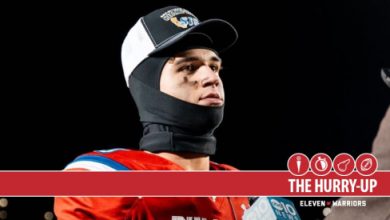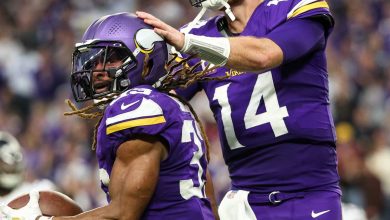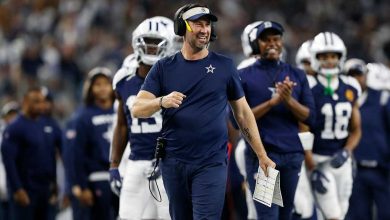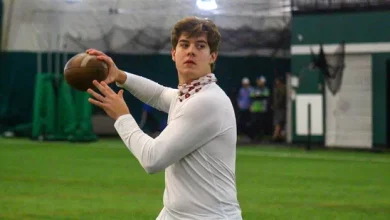Nico Iamaleava’s public renegotiation has left #collegefootball with a huge dilemma:

In the rapidly evolving world of college football, the intersection of sports and business has never been more visible. The introduction of the NIL (Name, Image, and Likeness) deal revolutionized how college athletes can profit from their talents, leading to new opportunities but also stirring up tensions across the landscape. One of the most publicized and controversial instances of this shift came when Nico Iamaleava, a highly regarded quarterback prospect, engaged in a public renegotiation of his NIL deal.
Iamaleava’s renegotiation sent shockwaves through college football, leaving the sport with a dilemma that could have lasting implications for both athletes and programs. As the first domino to fall in what many now see as a possible trend, his actions raised important questions about the future of NIL, the competitive landscape, and the ethical considerations surrounding these deals.
The Rise of Nico Iamaleava
To understand the magnitude of Iamaleava’s renegotiation, it’s essential to first look at his rise in college football. Born in 2005, Nico Iamaleava is a dual-threat quarterback who quickly became one of the most highly sought-after prospects in high school football. His combination of size, athleticism, and football IQ made him a standout from an early age. By the time he was finishing his junior season, Iamaleava was already being touted as the next big thing in college football.
Iamaleava’s recruiting profile skyrocketed with every game he played. Major programs, including Alabama, Georgia, Ohio State, and Oregon, came knocking, but it was Tennessee that ultimately won the recruitment battle, offering Iamaleava a chance to lead their program as the future face of the Tennessee Volunteers. What made his recruitment even more intriguing, however, wasn’t just his on-field talent—it was the business side of the equation.
The NIL deal, introduced in 2021 by the NCAA, allows college athletes to profit off their name, image, and likeness. For a star like Iamaleava, this presented a huge opportunity. Tennessee’s athletic department and boosters were quick to capitalize on Iamaleava’s immense popularity, offering him a series of lucrative deals with local businesses and national brands. This not only made Iamaleava one of the highest-paid college athletes but also set a precedent for the type of compensation that would become the norm for future stars in college sports.
The Renegotiation: A Public Display of Power
However, the honeymoon phase of Iamaleava’s NIL deals would not last long. As he entered his freshman season at Tennessee, a situation emerged that would forever change the landscape of college football’s NIL landscape. With NIL compensation rising in importance, Iamaleava’s contract renegotiation sent a clear signal about the power dynamic between athletes, schools, and the business of college sports.
In early 2025, reports surfaced that Iamaleava had entered into a renegotiation of his NIL deal with Tennessee, seeking a larger contract with higher payouts as his value increased both on and off the field. The deal was renegotiated publicly, with significant media attention surrounding the process. The renegotiation sent shockwaves through the world of college football for several reasons:
- The Public Nature of the Negotiation: While NIL deals had become commonplace in college athletics, most of these deals were kept behind closed doors. Iamaleava’s decision to renegotiate his deal in the public eye created a firestorm of controversy. Fans, media, and coaches were left to speculate about the details of his deal, while many questioned whether such public negotiations were appropriate or detrimental to the integrity of the sport.
- The Amount of Money Involved: While the specific numbers of the renegotiated deal were not fully disclosed, reports indicated that Iamaleava’s new NIL contract would eclipse previous records for college athletes. Some estimates suggested that the deal could surpass $10 million in total value, far outpacing anything that had come before it. The scale of the money involved raised eyebrows across the industry, drawing attention to the increasing commercialization of college athletics.
- The Power Shift to Athletes: Iamaleava’s renegotiation represented a dramatic shift in the power dynamic between athletes and their schools. In the past, college football players were essentially at the mercy of their coaches and universities, with little ability to leverage their individual market value. Now, athletes like Iamaleava were able to dictate terms and negotiate multimillion-dollar contracts, flipping the traditional model on its head.
- Recruitment Implications: The renegotiation also sparked fears about the direction of college football recruiting. Many were concerned that Iamaleava’s situation would set a dangerous precedent, with future recruits potentially prioritizing NIL offers over academic and athletic opportunities. The prospect of players transferring based on NIL deals became a real possibility, creating instability in college rosters and complicating the recruiting process for coaches.
The Dilemma for College Football
Iamaleava’s public renegotiation left college football grappling with several key dilemmas:
- The Integrity of the Sport: The heart of the debate surrounding Iamaleava’s renegotiation centers on the potential erosion of college football’s integrity. As more athletes become financially independent from their universities, critics argue that the focus could shift from athletic performance to financial gain. College football, at its core, is a sport that has long been built on tradition, loyalty, and team cohesion. The rise of NIL money, however, could encourage players to prioritize their financial interests over team success, leading to a less cohesive, more fragmented culture within college sports.
- Fairness and Equity Across Programs: The emergence of massive NIL deals for top-tier recruits creates an uneven playing field for college football programs. Schools with deep-pocketed boosters and affluent fan bases will be able to attract the best players, while programs without the same financial resources may struggle to compete. Smaller programs, which have historically prided themselves on developing talent without the financial incentive of major programs, may find themselves at a disadvantage. This could create a growing disparity between the “haves” and “have-nots” in college football, undermining the competitive balance that has long defined the sport.
- The Risk of Player Exploitation: While NIL deals were intended to empower athletes, they have also introduced new challenges, including the risk of exploitation. Some athletes may not fully understand the financial implications of their deals or may be pressured into signing contracts that are not in their best interests. There’s also the concern that, as the financial stakes increase, athletes could become commodities, with their worth determined solely by their marketability rather than their talent or character. Iamaleava’s situation, with its very public nature, raised the question of whether young athletes are truly equipped to handle the immense pressure and responsibility that comes with multi-million-dollar contracts.
- NCAA’s Role and Future Regulation: The NCAA, which has historically governed the college sports landscape, has been largely absent from the NIL discussion, leaving it up to individual schools and states to regulate deals. As NIL compensation grows, the NCAA will likely be forced to step in and establish clearer guidelines for how these deals should be handled. The challenge will be balancing fair compensation for athletes with the preservation of the traditional college football experience. The dilemma, however, is whether any regulation can keep pace with the rapid changes occurring in the world of NIL.
The Future of College Football: A New Era?
As the dust settles from Iamaleava’s public renegotiation, it’s clear that the landscape of college football is shifting. For better or worse, the NIL era has arrived, and it’s only going to grow more complex. Iamaleava’s deal may be one of the first high-profile renegotiations, but it certainly won’t be the last. With the growing commercialization of college athletics, future stars will undoubtedly demand similar contracts, and the negotiation process will likely become even more public and contentious.
The true challenge for college football moving forward will be to find a balance between maintaining the integrity and spirit of the sport while embracing the reality of the financial opportunities that NIL provides. Programs, athletes, and governing bodies will need to navigate this new era carefully to ensure that college football remains a competitive, fair, and ethical environment.
Nico Iamaleava’s public renegotiation has certainly left its mark on the sport, forcing college football to reckon with difficult questions about money, power, and the future of amateur athletics. Only time will tell how the sport adapts to this brave new world.









